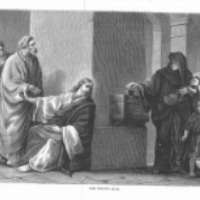Rich Californians Give Smaller Percentage of Income to Charities

In the gospel story of the widow’s mite, a poor widow’s donation of her last two pennies earns far more praise than the extravagant donations of the rich because the widow kept nothing for herself while the wealthy held back plenty for themselves. According to a study of charitable giving published last week, things haven’t changed much in 2,000 years, as rich Americans, including Californians, donate a smaller portion of their income—and an even smaller portion of their wealth—to charity than those less fortunate.
The study found that Americans who earned $50,000 or more in 2008 and itemized their deductions donated a median of 4.7% of their discretionary income to charitable causes, and that middle class Americans give a far larger share of their discretionary income to charity than the rich. Households earning $50,000 to $75,000 give an average of 7.6%, while those making $100,000 or more give only 4.2%, and rich people living in wealthy enclaves like gated communities give only 2.8%. Apparently, the wealthy are a bad influence on one another.
Discretionary income is money left over from earnings after paying for essentials, like food and housing.
Californians ranked 26th out of 50 states (and the District of Columbia) in overall charitable contributions, donating 4.4% of their income. But those at the lower end of the income scale, between $50,000 and $100,000, gave 6.2%, despite having discretionary income of just $29,226. People in the $100,000-$200,000 range, with discretionary income of $76,372, gave 3.9%. And those making more than $200,000, with discretionary income of $312,780, gave 4%.
The study also found that tax incentives matter to charitable giving. In addition to the federal income tax deduction for charitable giving, at least 13 states offer their own special tax benefits. In Arizona, for example, charities are gaining more than $100 million a year from tax credits adopted in recent years.
Religion strongly influences charitable giving. The more religious regions of the U.S. give more to charity—but only if one counts all donations to religious organizations as gifts to charity. Two of the top nine states—Utah and Idaho—have high numbers of Mormon residents, who traditionally give at least 10% of their income to their church, and the remaining states in the top nine are all in the Bible Belt. Yet much of what organized religion does has little to do with charity and more to do with institutional self-preservation and even political activity. In 2008, for example, giving to the Mormon Church spiked while it was playing a crucial role in passing a California ballot measure banning gay marriage.
When religious giving isn’t counted, the geography of giving nearly reverses itself, as New York jumps from No. 18 to No. 2, and Pennsylvania climbs from No. 40 to No. 4. Similarly, the greater generosity of so-called “Red” states, which tend to vote Republican, compared to “Blue” states that vote Democratic also disappears when religious giving is excluded.
-Matt Bewig
California Tops in Charitable Giving; Wealthy often Play Scrooge (by Tiffany Hsu, Los Angeles Times)
How America Gives (The Chronicle of Philanthropy)
America’s Generosity Divide (by Emily Gipple and Ben Gose, The Chronicle of Philanthropy)
How States Stack Up in Generosity (The Chronicle of Philanthropy)
Wealthiest Zips in Orange County California (Orange County Register)
- Top Stories
- Controversies
- Where is the Money Going?
- California and the Nation
- Appointments and Resignations
- Unusual News
- Latest News
- California Forbids U.S. Immigration Agents from Pretending to be Police
- California Lawmakers Urged to Strip “Self-Dealing” Tax Board of Its Duties
- Big Oil’s Grip on California
- Santa Cruz Police See Homeland Security Betrayal in Use of Gang Roundup as Cover for Immigration Raid
- Oil Companies Face Deadline to Stop Polluting California Groundwater





